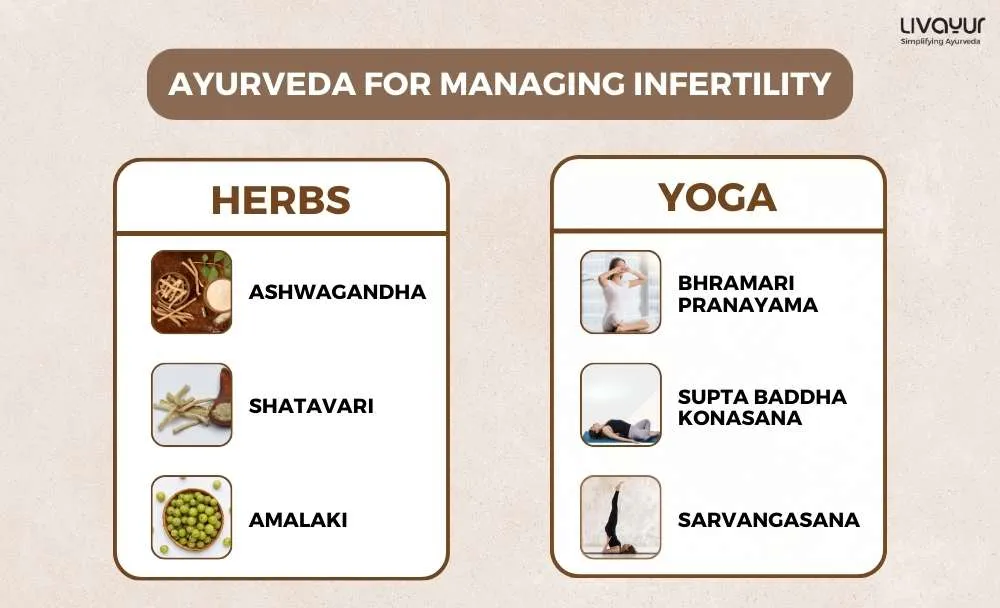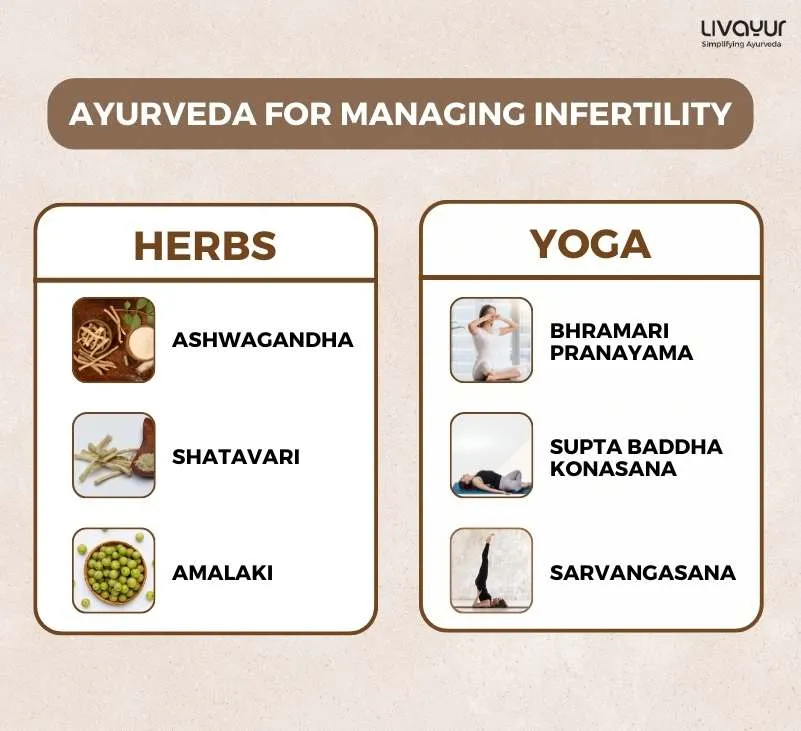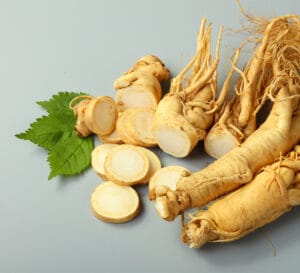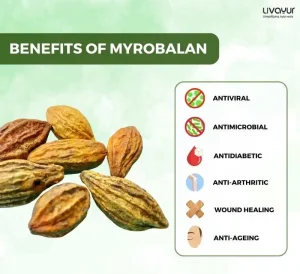
Are you experiencing infertility? If yes, then you have come to the right place.
Here is everything you need to know about infertility, infertility types and causes, infertility symptoms, Ayurvedic treatment for infertility in females, and more. By learning about your condition and following Ayurvedic guidelines, you can easily overcome this condition and start your journey towards parenthood.
What Is Infertility? [1]
Infertility is a prevalent reproductive system disorder that affects many individuals worldwide. It is a condition in which you can’t get pregnant after one year of trying to conceive.
Infertility in Women Symptoms
The most common sign of infertility is the inability to get pregnant. However, some individuals may also experience physical symptoms like pelvic or abdominal pain and irregular periods.
Causes of Infertility in Women [2]
Female infertility can be caused by a variety of factors that affect the ovaries, fallopian tubes, and uterus. Here are some of the most common causes:
- Disruption of ovarian function: Irregular or absent ovulation can make it difficult to get pregnant. Common causes include polycystic ovary syndrome (PCOS), diminished ovarian reserve (DOR), functional hypothalamic amenorrhea (FHA), and improper function of the hypothalamus and pituitary glands. Premature ovarian insufficiency (POI) is another condition that can cause irregular ovulation.
- Fallopian tube obstruction: When the fallopian tubes are blocked or swollen, the egg cannot travel from the ovary to the uterus, preventing fertilisation. This can be caused by infections, endometriosis, or previous surgeries.
- Uterine factors: Abnormalities in the uterus, such as fibroids, polyps, or adhesions, can prevent the implantation of a fertilised egg.
Infertility Types [5]
Infertility can be classified into different types based on the circumstances of the woman trying to conceive. These types of infertility include:
- Primary infertility: The patient has never been pregnant and is unable to conceive after one year (or six months if they are 35 or older)
- Secondary infertility: The patient can’t get pregnant again after having at least one successful pregnancy
- Unexplained infertility: No reason has been found through fertility testing as to why the patient or couple is unable to get pregnant.
Infertility in Ayurveda [3]
According to Ayurveda, healthy sperm, a healthy ovum, and a healthy uterus are essential for conception, all of which depend on the health of the Shukra Dhatu or reproductive tissue.
Ayurveda says Doshas can significantly affect your Shukra Dhatu and consequently fertility. An imbalanced Vata can cause functional defects in the egg, and Pitta can lead to scarred fallopian tubes. Kapha may naturally support Shukra Dhatu, but it can get affected by a sedentary lifestyle and a heavy and oily diet.
Ayurvedic infertility treatment aims at improving overall health by boosting digestion and eliminating Ama or toxins. Ayurvedic doctors evaluate your Doshas and prescribe a treatment plan, including diet, herbs, therapies, lifestyle, and yoga, according to your needs.
By maintaining balance in Doshas and overall health, Ayurveda provides fertile ground for the embryo to implant and grow and promotes natural conception.
Ayurvedic Diet for Infertility [3]
Ayurveda emphasises the importance of dietary management to treat infertility. This involves eating whole foods such as organic fruits, vegetables, plant-based protein, and sweet whole grains.
Specific foods like milk, ghee, nuts, sesame seeds, dates, pumpkin seeds, honey, saffron, asparagus, and spices like turmeric, cumin, and ajwain powder are also recommended to improve fertility rates. In contrast, processed carbohydrates, excess starch, antibiotic-laden meat and milk, canned produce, and trans-fats can reduce fertility and therefore are recommended to be avoided.
Incorporating foods like spinach, beans, pumpkin, tomatoes, and beets that boost iron levels can also promote fertility.
Ayurveda also recommends drinking warm water and digestive teas to keep the body hydrated while avoiding artificial sweeteners, MSG, high-fat diets, excess alcohol, and caffeine.
Ayurvedic Herbs for Infertility [3]
Ayurvedic herbs play a significant role in treating infertility. Ayurveda recommends using a combination of herbs to enhance overall health and wellness, regulate menstrual cycles, and promote fertility. Some of the best Ayurvedic herbs include Ashwagandha, Shatavari, Amalaki, Ashoka, and Guggulu.
However, you must always consult an Ayurvedic practitioner to determine the appropriate dosage and combination of herbs based on your body constitution and medical needs.
Ayurvedic Therapies for Infertility [3]
Ayurvedic therapies have been used for centuries to release tension, impurities, and trapped energy within the body. Some popular Ayurvedic therapies for infertility include:
- Shirodhara, Abhyanga, marma therapy, Nasya and Basti to release tension and impurities from the body, rejuvenate the mind, strengthen the immune system, and pacify the Doshas
- Panchakarma for removing toxins from the body and balancing the Doshas
- Basti, or Ayurvedic enema, to remove Vata disorders
- Ayurvedic massage to reduce stress, rejuvenate the entire body, and pacify the Doshas
- Deep tissue workouts to decrease mechanical blockages, reduce pelvic pain, and improve sexual arousal and orgasm for women
Yoga for Infertility [4]
- Bhramari Pranayama (Bee Breath): It helps stress and anxiety, which can contribute to infertility.
- Paschimottanasana (Seated Forward Fold): It helps stimulate the ovaries and uterus responsible for the conception and relieve stress in the lower back and hips.
- Supta Baddha Konasana (Reclining Bound Angle): It aids in relieving discomfort associated with IVF, menstrual cramps, and fertility treatments.
- Sarvangasana (Shoulder Stand): It helps stimulate the thyroid gland, regulate hormones, and reduce stress.
Home Remedies for Infertility
There are some effective home remedies to complement the Ayurvedic infertility treatment. Some of the infertility home remedies are:
1. Stinging Nettle Tea
Drink 2 to 3 cups of tea made from the leaves of Stinging Nettle or Bichhua ke patte to treat infertility. [7]
2. Raspberry Leaf Extracts
Hormonal imbalances may interfere with a woman’s fertility. Taking Raspberry leaf extracts can bring the raging hormones back to normal and help with conception. [8]
3. Cinnamon Powder
Mix 1 teaspoon cinnamon powder in a cup of hot water and drink daily. Cinnamon can restore hormonal balance and regularize your menstrual cycle, thereby helping you conceive. [6]
4. Pomegranate Juice
Drinking Pomegranate juice everyday can boost blood flow to the uterus and nourish it. This may improve your chances of conception. [6]
5. Sesame Oil Massage
Massaging the lower abdomen with Sesame Oil boosts the flow of oxygen to a woman’s uterus and makes her more fertile. However, make sure the oil is warm.
When to Seek Medical Help
You must seek medical help under the following circumstances:
- You’re younger than 35 years of age and have been trying to conceive for almost one year.
- You’re 35 years old or beyond and have been trying to conceive for at least six months.
- You have irregular periods, very painful periods, or no periods at all.
FAQs
1. What are the non-Ayurvedic infertility treatments?
Western medicine treats infertility through medications, surgeries and assisted conceptions such as In Vitro Fertilization or IVF and Intrauterine insemination or IUI. [2]
2. Can lubricants interfere with female fertility?
Yes, lubricant may interfere with fertility. Lubricants may reduce the sperm’s motility and stop the sperm from reaching the egg or ovum.
3. Can coffee make me infertile?
There are no scientific studies to prove that caffeine affects a woman’s fertility. But caffeine may harm your body in other ways. So, it is best to avoid coffee when you are trying to get pregnant.
4. What is meant by the fertile window?
A woman’s fertile window is the time during her monthly menstrual cycle when she is most likely to conceive. For most people, it’s the five fertile days leading up to ovulation, the day of ovulation, and the day after ovulation.
5. Can a woman become pregnant during her period?
Yes, a woman could become pregnant if she indulges in sex while her periods are going on.
Conclusion
Infertility is a common problem which affects both men and women. However, you can easily treat infertility with the help of Ayurveda. Types of pregnancy treatment recommended by Ayurveda involve the use of proper diet, fertility-boosting herbs, yoga and therapies such as Shirodhara and Basti to boost fertility and treat the underlying causes of infertility.
Disclaimer
This article is written from a health & lifestyle perspective. Please consult a trained medical practitioner at all times. These are general information only and are not intended to replace professional advice or treatment.
References
- CAUSES OF INFERTILITY IN WOMEN AT REPRODUCTIVE AGE
- Infertility FAQs
- Ayurvedic concepts of female fertility-A Review
- FEMALE INFERTILITY: AN OVERVIEW
- Types of Infertility and Its Risk Factors among Infertile Women: A Prospective Study in Dhaka City
- Female infertility and herbal medicine: An overview of the new findings
- Use of complementary and alternative medicines by a sample of Turkish women for infertility enhancement: a descriptive study
- Overview on raspberry leaves and cohosh (Caulophyllum thalictroides) as partus preparatory

























